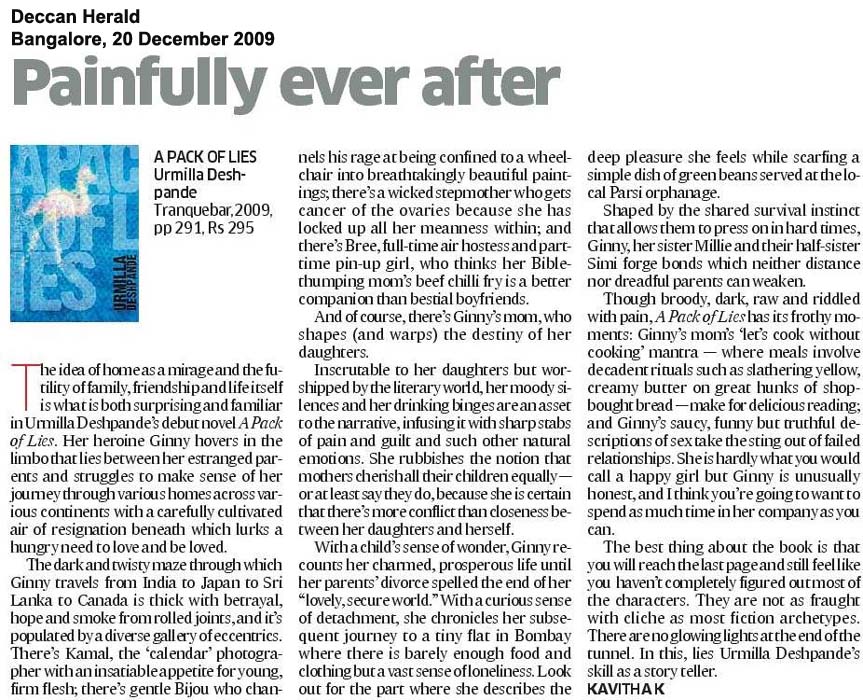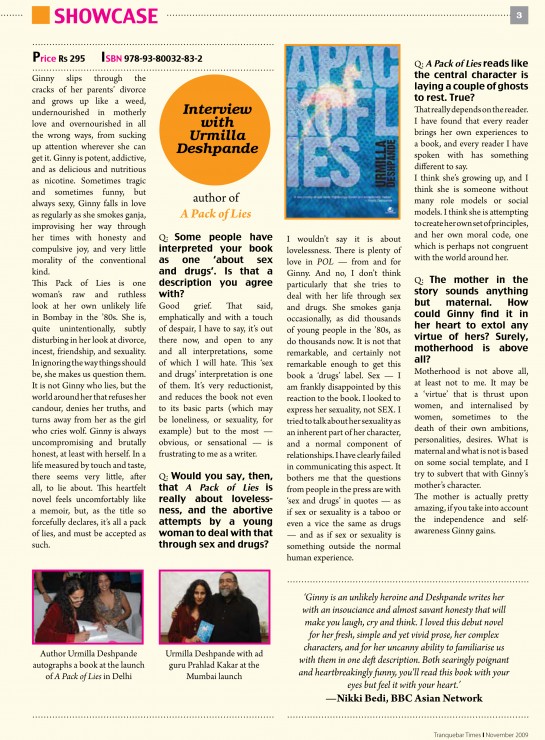 Kashmir Blues takes in its expansive narrative sweep the characters’ lives from southern California to the seedy streets of Mumbai, to the charmed circles of India’s rich and powerful, and to Kashmir, strife-torn vale of guns and flowers. Insurgency, socio-political unrest, smuggling, drugs, espionage and conflict cast their shadows. Yet this is a story told with deep compassion. Even the most potentially evil characters can startle by revealing positive human and humane facets. As the author says, “I don’t think either sapphires in my book or diamonds in West Africa are the basis of strife. Nor is religious fundamentalism. It is the inequitable distribution of resources, structural poverty, that sends people into conflict and civil war. Institutionalised injustice.” Kashmir Blues takes in its expansive narrative sweep the characters’ lives from southern California to the seedy streets of Mumbai, to the charmed circles of India’s rich and powerful, and to Kashmir, strife-torn vale of guns and flowers. Insurgency, socio-political unrest, smuggling, drugs, espionage and conflict cast their shadows. Yet this is a story told with deep compassion. Even the most potentially evil characters can startle by revealing positive human and humane facets. As the author says, “I don’t think either sapphires in my book or diamonds in West Africa are the basis of strife. Nor is religious fundamentalism. It is the inequitable distribution of resources, structural poverty, that sends people into conflict and civil war. Institutionalised injustice.”
Author Urmilla Deshpande began writing relatively later in life, though she always wrote and told stories. “Living in America without a work permit, between doing laundry, cooking, dishes, driving kids around, my mind wandered into strange territories. Writing may have been an escape from the intense grief of my mother’s death, and slow acceptance of her non-existence. Kashmir Blues is an escape, totally unrelated to my own life. It distracted me, yet gave me purpose.”
While there is no direct connection between the author’s life and the book, she chose to write about Kashmir and the divide caused by growing religious fundamentalism. “Maybe it wasn’t flashes of inspiration, “she explains,” but observation, experience, memory, everything I see and read and hear that is fodder for stories. I have to suppress fear of disapproval and consideration for peoples’ feelings and just write. I have been a photographer, but not like Leon, and I have smoked ganja on occasion but didn’t have a drug dependency, I was not adopted or stolen nor did I lose my parents, or child. And, I have never been to Kashmir. It’s a made-up story. Maybe living in post 9/11 America, or editing a book on civil wars had something to do with it, but these are all fragments of what’s around. I guess I just steal from everything.”
The unique Kashmir blue sapphires, the legendary tears of Shiva; the beautiful Kashmiri carpet symbolic of the land and its unravelling with growing strife; the ubiquitous brown dog which seems to follow Leon everywhere; the importance of taking, or breaking free from the spell of drugs; myriad enduring images bind Kashmir Blues. Urmilla Deshpande’s writing displays a cinematic quality. “While writing I feel as if I follow the action,” she says, “in the minds of characters and what happens around them. Like watching a movie and taking notes. I’m not saying it is mystical and ‘comes to me’. More, it’s free association of memories and experiences coalescing into a narrative. I find it hard to go back and say why something happened a particular way. I had to make the changes and address flaws my lovely editor pointed out, but I go back reluctantly. Because then I start reading it as a reader, and inconsistencies and doubts pop up.”
The ‘tears of Shiva’ is made up from stories Urmilla’s mother-in-law told of sapphires bringing bad luck. While the author herself isn’t into religion, superstition, or jewels in real life, she found these ideas interesting.
“As for the brown dog, he’s always around, isn’t he?” Urmilla quips with a mischievous twinkle in her eyes.
Naia and her deep bond with Leon, the photographer with the urge to self-destruct; Samaad the well-educated and far-sighted carpet dealer and warlord in the making; Frank the addicted German wanderer; Viren the diplomat; Saroj who mourns the public loss of her daughter and the private loss of sexual fulfilment; the main players in the story are clearly and credibly portrayed. However, there is an odd note in the rather filmi melodramatic way in which Naia is adopted.
“This incident was one of the major changes I made in the editing process” Urmilla says.“I would have loved to leave it vague with not much explanation. But that might have led to different questions about inconsistency! It’s hard to write for everyone, and I don’t do that. I have to be clear myself. I love that you find it filmi—maybe someone will make this into a filmi film—starring Jeremy Piven as Leon (It has to be Jeremy Piven). Writing is a delight and a pleasure in itself. But it’s short lived. After that, my fulfilment comes from readers’ interpretations. People bring themselves to the books they read—and I am always surprised by what they come up with.”
As for the ideas and inspirations behind the characters, Urmilla shares how her mother once said that characters write themselves. “I thought her a bit mad, but find (as we do about our parents) that she was right. Once characters come to life, it’s hard to make them act in inconsistent ways without putting them in situations where they would break character, or reveal some unseen part of themselves.” Once Urmilla began to write Anne, her depression, her infertility, her fascination with babies and her distress over the street children in Bombay all led up to that moment when she did what she did. One of her favourite people in the book is Saroj.
“I felt her, heard her voice more than any other. Odd, because I have almost nothing in common with her. I am unable to explain where these people come from or why they do what they do. It is a fast process for me, the actual writing of a novel, but I think life and experience should be counted as part of the process. In which case I would have to say, I’ve been preparing every day of my life to be a writer, and when I was ready, I wrote!”
Urmilla plans to go back to two unfinished novels as soon as she is done with erotic short stories that she took on almost as a challenge from Prita Maitra, her editor. Though she has never written erotic before—not intentionally as a genre anyway – she’s found it “fun so far.” She has also completed editing a book about IIT Bombay’s Hostel four. |


 Kashmir Blues takes in its expansive narrative sweep the characters’ lives from southern California to the seedy streets of Mumbai, to the charmed circles of India’s rich and powerful, and to Kashmir, strife-torn vale of guns and flowers. Insurgency, socio-political unrest, smuggling, drugs, espionage and conflict cast their shadows. Yet this is a story told with deep compassion. Even the most potentially evil characters can startle by revealing positive human and humane facets. As the author says, “I don’t think either sapphires in my book or diamonds in West Africa are the basis of strife. Nor is religious fundamentalism. It is the inequitable distribution of resources, structural poverty, that sends people into conflict and civil war. Institutionalised injustice.”
Kashmir Blues takes in its expansive narrative sweep the characters’ lives from southern California to the seedy streets of Mumbai, to the charmed circles of India’s rich and powerful, and to Kashmir, strife-torn vale of guns and flowers. Insurgency, socio-political unrest, smuggling, drugs, espionage and conflict cast their shadows. Yet this is a story told with deep compassion. Even the most potentially evil characters can startle by revealing positive human and humane facets. As the author says, “I don’t think either sapphires in my book or diamonds in West Africa are the basis of strife. Nor is religious fundamentalism. It is the inequitable distribution of resources, structural poverty, that sends people into conflict and civil war. Institutionalised injustice.”


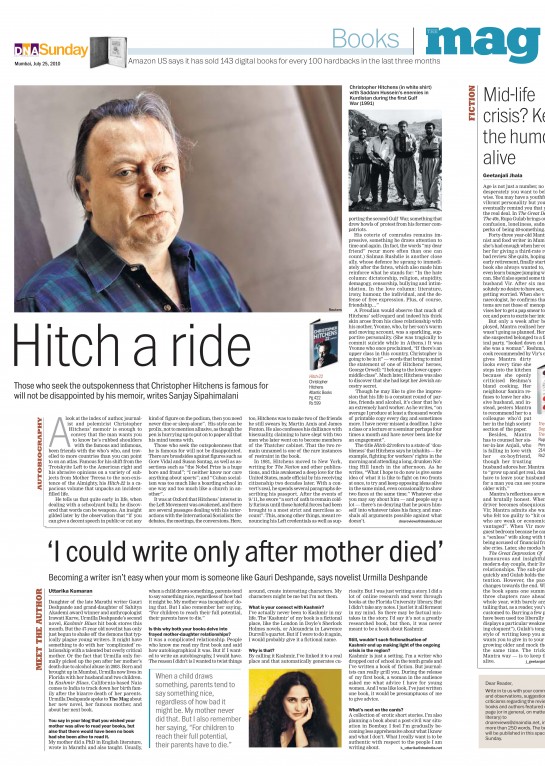

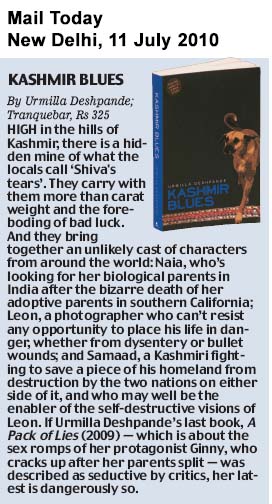
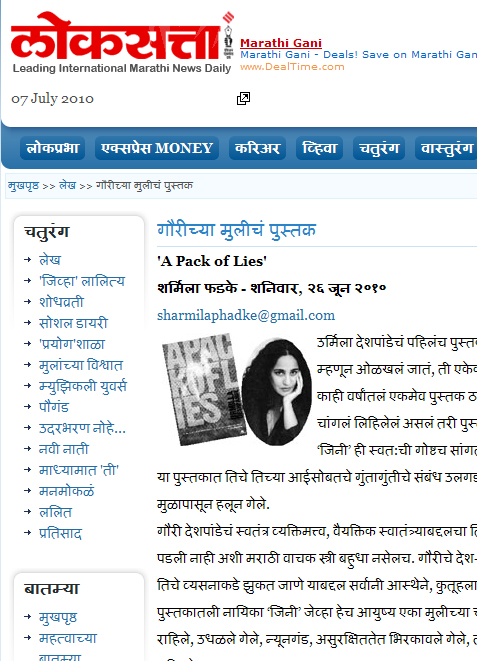

 POL featured in Non-fiction, but, thank you Nilanjana!
POL featured in Non-fiction, but, thank you Nilanjana!